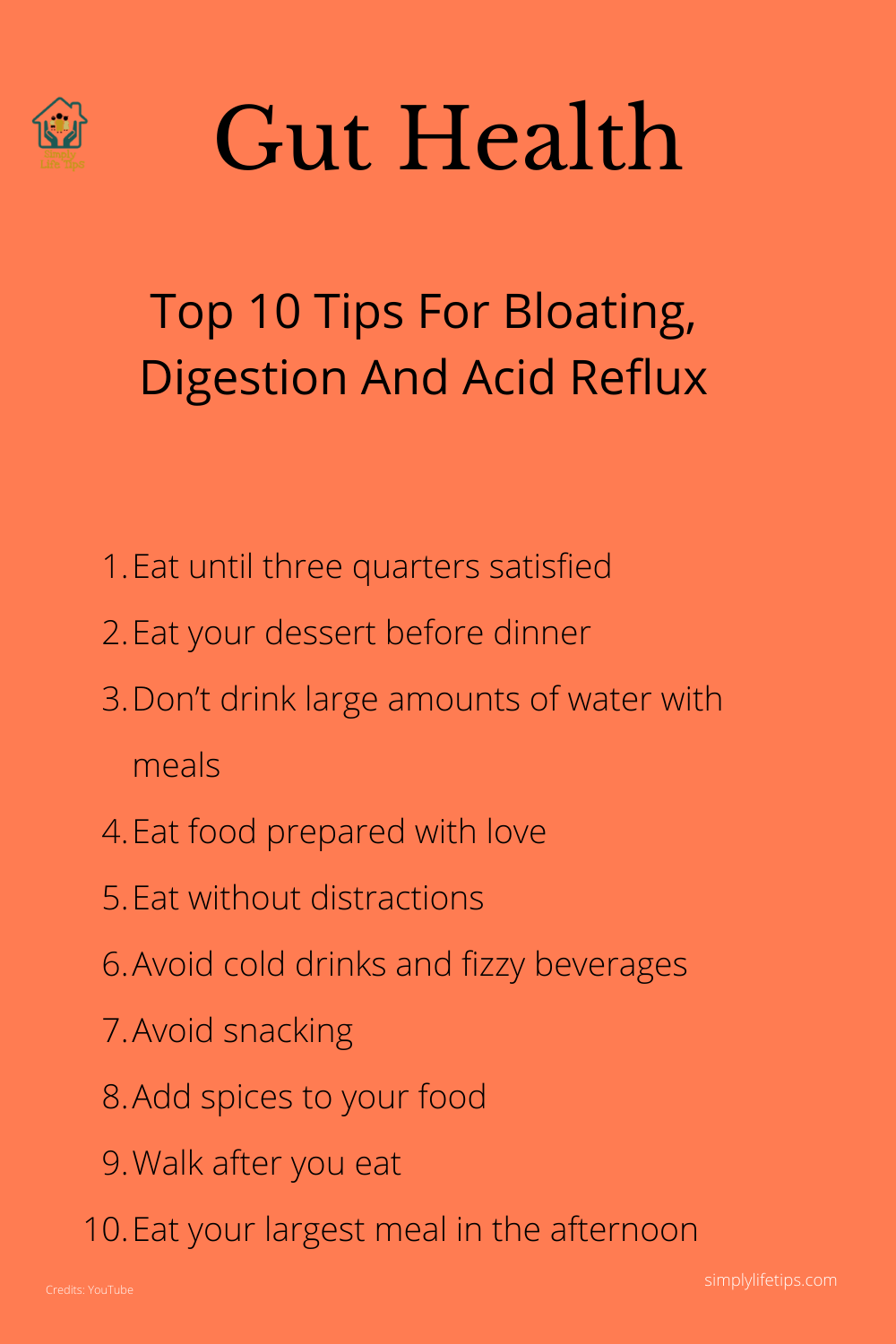Do you know you can improve your gut health by changing your eating habits? Gut health refers to the physical state and physiologic function of the many parts of the gastrointestinal tract. Many people experience frequent digestive problems such as bloating, loose stools, abdominal pain, constipation, heartburn, nausea or vomiting. Most times, they give a common name ‘gas problem’ for all these symptoms and do some self-treatment. They identify the problem with their food choices, but most times they are unable to control their eating habit. It is true that our food choices are common causes of digestive problems, heartburn, bloating and constipation.
Disclaimer: This is just for informational purpose only. Information and tips shared in the article do not represent or treated as health expert advice. You should seek and follow health expert advice for your problems.
What is ‘gut health’?
“Gut health” describes the function and balance of bacteria of the many parts of the gastrointestinal tract. Ideally, organs such as the esophagus, stomach and intestines all work together to allow us to eat and digest food without discomfort. A healthy gut contains healthy bacteria and immune cells that ward off infectious agents like bacteria, viruses and fungi. A healthy gut also communicates with the brain through nerves and hormones, which helps maintain general health and well-being. Source: UC Davis Health
10 Tips for gut health

- Eat until three-quarters satisfied
- Eat your dessert before dinner
- Don’t drink large amounts of water with meals
- Eat food prepared with love
- Eat without distractions
- Avoid cold drinks and fizzy beverages
- Avoid snacking
- Add spices to your food
- Walk after you eat
- Eat your largest meal in the afternoon
How can you improve your gut health?
These are the 10 food rules that I was taught by my teacher Dr Halpen. He is the founder of the California College Of Ayurveda. He said to us that “it’s not what you eat, it’s how you eat that’s important.” And he said that “90 per cent of our gut issues or our conditions that we have are caused because of how we eat, not what we eat.”
He gave us these 10 food rules and he said that many of the people that he has seen in clinics throughout years and years of work he noticed that just by giving them these 10 food rules ignoring even the actual conditions that they had started them off with these 10 food rules and letting them follow it for a minimum of a month made a phenomenal difference on their health. And so I thought I’d share them with you. There are 10 nuggets of wisdom that I genuinely feel have made a difference to me and I hope will make a difference to you too.
1. Eat until three-quarters satisfied for gut health
I recommend eating three-quarters satisfied which is perfect, not full but satisfied. Overeating increases the production of free radicals in our body which affects the process of ageing and accelerates it. It also overloads our digestion. This means that our food may not be digested properly which means that food is left in our stomach and ferments and leads to toxins building up in our body.

One tip that I can give from my own personal experience of overeating is to be mindful when we’re eating. Practising conscious eating. And that’s simple things like cutting up our food into smaller pieces, taking time while we’re eating to chew, count the number of times that we are chewing. All these little things can really make a difference in our overeating. Our body needs time to know that we are full. Our mind needs time to know that we are full. And so we have to give time for our mind and our body to align and send signals to one another to let us know that we’ve had enough.
2. Eat your dessert before dinner for gut health
I’m pretty sure you’re not going to be mad about this one. It’s because it’s your desire before dinner they had hot water before. So I bet this one was a bit of a surprise to you but in Ayurveda, it says that if you are wanting to have something sweet either have it before your meal or have it as a snack between your meals. This is because sweet foods or sugars actually take a longer period of time to digest. So let’s say you’ve eaten your meal and then you have your dessert after, your body will actually prioritize digesting the sweet stuff and so it will put aside the meal that you’ve just had and focus on the sugars instead.

3. Don’t drink large amounts of water with your meals
Drinking large amounts of water with your meal actually ends up slowing down your digestive process. The acids in your stomach that are meant for digestion get diluted and so it takes a longer period of time that your food to be in your stomach which again ends up leading it to ferment and can build up toxins. So if you do want to drink with your meal make sure you’re taking small sips throughout your meal and a maximum of half a cup. you’re gonna throw in your cucumbers, a little bit of salt and then don’t forget to sprinkle some love and some more love.
Read How To Drink Water The Right Way? Have You Been Drinking Water All Wrong?
4. Eat food prepared with love
Cooking with love and positive intention can genuinely affect how your food is digested. The term Prashad in Sanskrit which I’ve spoken about many times actually means food that’s cooked with love seasoned with devotion, offered to God, sealed with a prayer, and served with joy. In Ayurveda, it really emphasizes that the energy, the intention, and the mindset that we have while we’re cooking is infused into the food and so cooking with a clear mindset, with positive energy can really actually help us digest our food better.

And more importantly, if we are cooking for other people have that in mind too because then we are affecting them with our mindset and our intentions too. Cooking with love is an essential part of optimal digestion. In this way, food ends up not being just something that nourishes your body but it can have the opportunity if cooked in this way to nourish your mind and soul too.
5. Eat without distractions
It’s become very natural for us to have our meals while doing something else whether it’s a quick lunch break where we’re still working and eating in between, whether it’s watching TV while we’re eating our dinners, watching something on our phones scrolling through social media. And actually, it says that food is such a sacred part of our day. Food is something that we have to realize nourishes our body that allows us to exist and carry out every single thing that we need to do during the day.

And so as a sign of respect towards the food and also a sacred moment in our day, we should eat with no distractions. Ideally sitting in a place with no external noise, even no music on. Silence is such a beautiful way to appreciate something and our meal should be no different. And that doesn’t mean that you have to sit in silence and say nothing to your partner if you’re having a lovely meal. But it just means having a calming space, a calming environment where you’re eating can make a huge difference.
Read Beat Digital Distraction With These 4 Excellent Habits
6. Avoid cold drinks and fizzy beverages
Having iced drinks with your meal can actually dampen your digestion making it harder for your food to digest. But also having fizzy drinks increases the gas that’s produced in your body which means that afterwards, the discomfort that you might feel after eating a meal is probably to do with that rather than the meal that you’re actually eating.
7. Avoid snacking
It is recommended that we have a minimum of a three-hour gap between our meals. I know that there are many schools of thought that suggest that we have mini-meals, breakfast a snack, lunch a snack, dinner and a snack afterwards. But according to Ayurveda, this actually disrupts our digestive cycle and it doesn’t give our stomach enough time to rest in between meals but also for our first meal to be digested before we then load on the next.
The analogy that’s given is of a rice cooker. So imagine you are cooking rice and then halfway through you decide to add in some more raw rice. And then half an hour later you decide to add on some more raw rice. By the end of it, you will either have extremely mushy rice to start with or if you take it out at the time that the first rice was put in your other rice won’t be cooked yet.

And it’s the same thing with our digestion. We have to allow our body to digest food one thing at a time before we overload it with the next meal. And that way our body is able to digest fully and again like we said no toxins, therefore, will be produced.
Remember, if you have Diabetes, snacking between meals may be necessary to maintain your blood sugar levels.
8. Add spices to your food
I’m not sure whether you’ve noticed but I really love spices. I really recommend adding spices to your foods as much as possible. Spices will slowly become your medicine box once you understand the beautiful varieties and qualities of spices. There’s a different spice for everything whether it’s gas, whether it’s bloating, whether it’s respiratory, whether it’s congestion, whether it’s for your mind. There are so many different spices that have so many different qualities and can affect your body differently. I personally feel like my spice box is like a protective armour that helps keep my body feeling optimum, it is optimum.
Read Beginners Guide To Healing Your Body With Spices Daily
9. Walk after you eat
Sitting or lying down straight after a meal is a big no-no. It actually squashes your digestive organs and doesn’t allow them the space that they need to carry out what they are meant to do. So if you want to maybe go for a little stroll in the park, go for a little romantic walk down the beach, go knock on your neighbour’s door and have a little chat, have a little gossip. Oh wait maybe don’t do the gossip but have a little chat, and enjoy each other’s company but whatever you do. Don’t sit down in front of the TV and squash your lovely digestive organs.

For as long as I can remember, my parents actually go for a walk every single night after their meal. A gentle walk, a gentle stroll for about 30 minutes and then you can come back and take a seat and do your leisure activities in the evening. But I should also suggest that you leave a three-hour gap or at least a two-hour gap before you sleep which again for the same reasons you are squashing your digestive organs and not letting them do their job. So the three-hour gap between meals but also a three-hour gap between your evening meal and your sleep time.
Read If You Walk Every Day What Will Happen To Your Body?
10. Eat your largest meal in the afternoon
Our body is in tune with nature and so just as the sun is at its peak and strongest in the afternoon. Our body is exactly the same. So actually having our largest meal in the afternoon is recommended. That’s when our digestion is the strongest. So having your largest meal in the afternoon and a smaller lighter meal that’s less complex with fewer flavours and also fewer ingredients is recommended in the evenings.

So this either may sound really easy to you or it may sound overwhelming. Either way, I would recommend starting off with a couple at a time. You don’t have to try and do all of them at once but incorporate one or two of them one week and then the next week add in another and the next week add in another. And hopefully, by 10 weeks’ time, you will have incorporated all of them into your lifestyle and they should become second nature to you. It may take a bit longer than that but I guarantee you will probably start noticing a difference just by incorporating one or two. So I hope that this is useful for you and I would love to hear your thoughts if you do end up trying these I would love to hear some.
Reference Video Script: YouTube Radhi Devlukia
Final Thoughts
Hope that you could find some useful tips for gut health. It is a fact that many people don’t have control over their eating and that is one of the major reasons for many diseases. They eat a lot more than needed and don’t exercise or do any physical activities which causes indigestion, acidity and other health problems. Most people working in offices are sitting for long hours and they either ignore or don’t have time to do any physical activity or exercise. Physical activity is a must for good physical and mental health. It is not that physical activities and exercises help you to build your muscles, but it also helps for a strong mind.
Health experts suggest small regular physical activities like gardening, washing vehicles, cleaning rooms and furniture and small exercises for healing depression, anxiety or such mental health problems. Eat for better health and not for filling your stomach. People with disturbed sleep may suffer from gas trouble, heartburn, nausea, bloating, constipation and other digestive concerns. Adequate sleep is essential for gut health as well as better physical and mental health. Follow a healthy diet and the best foods for sound sleep throughout the night. To get a night of better sleep you should reprogram your subconscious mind before you sleep.
Regular exercise is very helpful to reduce stress levels and maintain a healthy weight, which can have positive effects on gut health.
Recommended for further reading
- Food For Healthy Hair – What To Eat For Strong Healthy Hair?
- The Key Foods For Mental Health | Harvard Nutritional Psychiatrist
- Anti Aging Foods That Will Keep You Young And Healthy
- How To Boost Immune System With Food And Healthy Living
- 11 Foods To Boost Memory
- Mood Boosting Foods To Improve your Mood
Do you follow any of the above tips for gut health?
What do you do for digestive problems and gut health?
Kindly share this article on your network and help others to read it.
Please leave your views about this article in the comments box.

Mathukutty P. V. is the founder of Simply Life Tips. He is a Blogger, Content Writer, Influencer, and YouTuber. He is passionate about learning new skills. He is the Director of PokketCFO.
He lives with the notion of “SIMPLE LIVING, CREATIVE THINKING”. He Believes – “Sharing is caring.” and “Learning never ends.”



